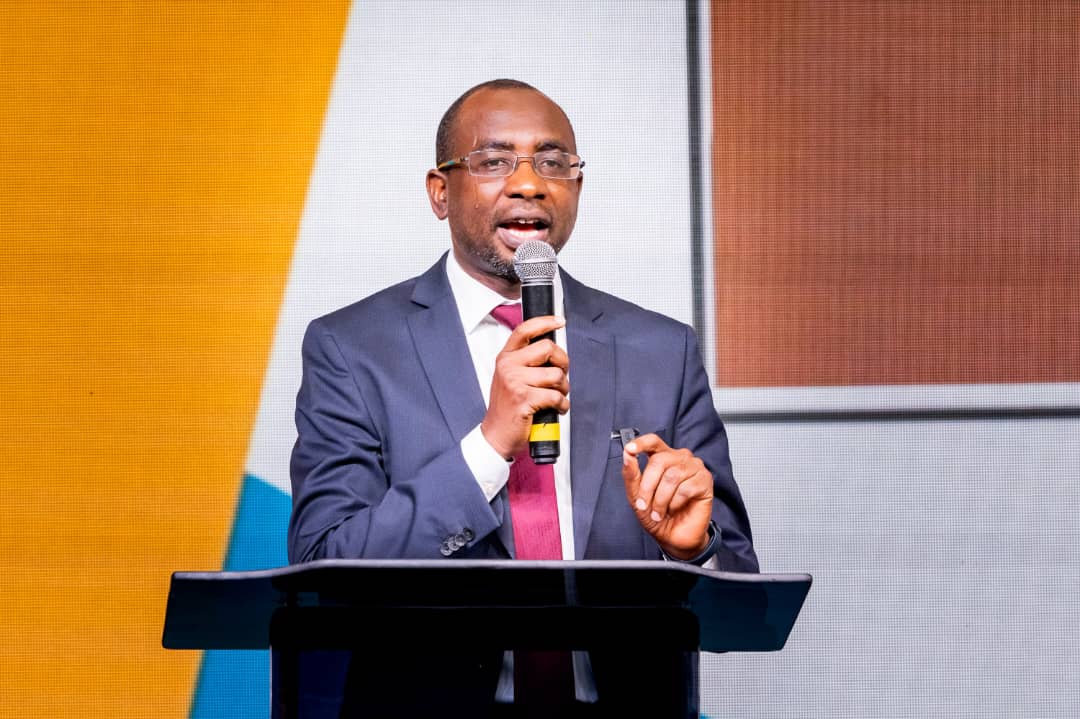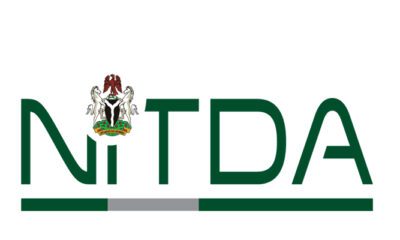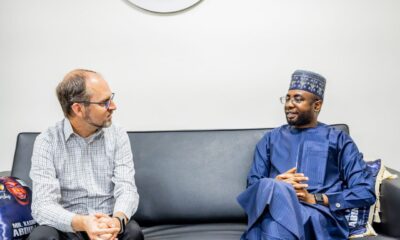Infotech
NITDA hosts stakeholders in Lagos on digital literacy awareness

The National Information Technology Development Agency (NITDA) has held a stakeholders meeting in Lagos to create awareness to bridge the digital divide and empower Nigerians with essential digital skills.
The agency held the session in partnership with the GIZ/DTC.
The Director-General of NITDA, Kashifu Inuwa Abdullahi, in his opening remarks, emphasised the critical role of digital literacy skills in today’s rapidly evolving digital landscape. He highlighted the NDLF as a comprehensive roadmap developed by NITDA, in collaboration with key stakeholders to equip Nigerians with the necessary digital skills to thrive in the digital age.
Inuwa, who was represented by Dr. Falilat Jimoh, of the Digital Inclusion Unit of the Agency’s South West Zonal Office (SWZO), asserted that the collaborative efforts with the Ministry of Education were underscored, focusing on integrating the framework’s provisions into the national school curriculum.
“This initiative aims to equip students from a young age with foundational digital skills essential for future success,” he noted.
Furthermore, he mentioned that NITDA’s partnership with GIZ/DTC is fostered to establish robust standards for digital literacy content, ensuring high-quality and relevant learning materials aligned with NDLF’s objectives.
Inuwa stressed that NITDA’s commitment to digital inclusion extends beyond formal education, with ongoing digital literacy programs targeting women, artisans, and other underserved segments of the society.
He emphasised the importance of collaborative efforts, stating that the framework enables the implementation of NITDA’s Strategic Roadmap and Action Plan (SRAP) 2.0, 2024–2027 pillars, “Fostering Digital Literacy and Cultivating Talents.”
The SRAP 2.0 is a living document that is being redrafted to align with the Federal Ministry of Communications, Innovation and Digital Economy policy document “Accelerating Our Collective Responsibility,” which has Five strategic pillars namely, Knowledge, Policy, Infrastructure, Innovation, Entrepreneurship & Capital, and Trade.
According to the NITDA boss, these programs aim to empower individuals to participate meaningfully in the digital economy and access online opportunities.
“This resonates with the Knowledge pillar of the Ministry tailored to accelerate the collective responsibilities of all stakeholders towards achieving inclusivity in all its dimensions which supports the Renewed Hope Agenda that is focused on propelling the Nigerian economy and enhancing the welfare of its citizens,” he said.
Hence, he stated that the workshop goal is to create widespread awareness about the NDLF through interactive sessions and discussions, providing stakeholders with a deeper understanding of its components, target audiences, and potential impact on bridging the digital divide among Nigerians.
Additionally, the Director-General emphasised the importance of collective action in the successful implementation of the NDLF, expressing gratitude for the collaboration with partners and the participation of stakeholders. He affirmed that the significance of tailoring the framework to the specific needs of Nigeria’s diverse population is to achieve maximum effectiveness.
In conclusion, Inuwa expressed confidence that the NDLF, coupled with collaborative efforts, will play a pivotal role in empowering Nigerians with the digital skills necessary to actively participate in the digital economy, and access online information and opportunities while contributing to a more inclusive and prosperous society. He then urged participants to continue collaborations to unlock the full potential of Nigeria’s digital future.
Earlier, the Commission Manager GIZ/DTC Nigeria, Dr. Thuweba Diwani in her opening remarks delivered by Olusegun Alimi, the Technical Advisor, GIZ/DTC Nigeria, anticipated that the awareness session would be an avenue to dialogue and come up with a “Participatory Policy Implementation Framework (PPIF)” he added, “for policies to be sustainable they need to be owned by the people.”
The Digital Transformation Centre Nigeria (DTC Nigeria) is a project funded by the European Union and the German Federal Ministry for Economic Cooperation and Development, implemented by Deutsche Gesellschaft Fuer Internationale Zusammenarbeit (GIZ). It focuses on digitalisation, innovation, and entrepreneurship in Nigeria, aiming to enhance the country’s digital innovation ecosystem and boost its capacity for adopting digital innovations for economic and societal growth.
Other Ministries, Departments and Agencies (MDAs) at the dialogue were, the National Orientation Agency (NOA), National Identity Management Commission (NIMC), Lagos Public Private Partnership (PPP), Lagos State Technical and Vocational Education Board (LASTVEB), Lagos State Employment Trust Fund (LSETF), also, the private sectors represented were MTN Foundation, CISCO, Tech4Dev, Faith Foundation among others.
The moderator, Mr. Tayo Olosunde an ecosystem industry enthusiast affirmed that the stakeholders’ sessions had also been held in Kano and Abuja.
Infotech
Kaduna Govt, Google, DSN launch first AI for beginners in Hausa


Google in collaboration with Data Science Nigeria (DSN) and the Kaduna State Government on Tuesday launched the first Artificial Intelligence (AI) in local language – “AI for Beginners in Hausa’’.
The initiative is aimed at empowering women in Northern Nigeria.
The Kaduna State governor, Sen. Uba Sani, in his address, expressed profound gratitude to the partners for building support for women to use technology to harness the social economic development of the state and the country as a whole.
The governor was represented by the Deputy Governor, Dr Hadiza Balarabe, at the launch of Arewa Ladies for Tech, and the launch and mural unveiling of AI for Beginners Learning Video series.
According to Sani, AI is not just the future; it’s the present.
“By equipping our people especially our women with AI skills, we are not only paving the way for a more prosperous and innovative Northern Nigeria but also laying the foundation for Kaduna to become a thriving tech hub.
‘’Today, as we gather for the official launch, I feel the pride that Kaduna State is at the forefront of digitalisation. This initiative to teach AI in Hausa will demystify the complex nature of AI,’’ he said.
He, however, appreciated the efforts of DNS , Google, for the tireless effort in ensuring the success of AI in local language.
“Your commitment to laying a vibrant and inclusive digital economy is commendable”.
The Director, West Africa, Google, Mr Olumide Balogun, said in his welcome address said that Google’s mission was to organise the world’s information and make it universally accessible and useful.
Balogun said that this mission drives Google to create opportunities that not only support individuals but also empower communities.
“In Nigeria, our vision is to unlock economic opportunities for everyone—whether you reside in Kaduna, Lagos, or Onitsha, and whether you are an entrepreneur, a student, or a trader.
“We strive to ensure that our programmes and efforts provide substantial opportunities for all.
“Technology, especially the power of the internet, has become a pivotal tool in accessing growth and enhancing lives.
“Yet, we recognise that many underserved communities and groups face significant barriers in harnessing these opportunities; this brings us to why we are here today,’’ he said.
He said that in 2023, through Google philanthropic arm, Google.org, made a steadfast commitment to address these challenges.
According to him, Google pledged a $1.5 million grant to empower 20,000 Nigerian women and youths from underserved communities with essential 21st-century skills
He said that this includes a plan to train 5,000 women and girls in areas such as data science and artificial intelligence through the Arewa Tech4Ladies initiative.
Balogun said that this initiative was a commitment to enhance the representation and inclusion of women in the tech sector.
He said that in 2023, Google launched this pioneering programme to train 5,000 women and girls in data science, artificial intelligence, and entrepreneurial digital technologies.
“Today, I am thrilled to announce the launch of a new educational initiative – `The AI for Beginners in Hausa Learning Series’.
“This video series is a key part of our Arewa Tech4Ladies programme, tailored specifically to make learning about Artificial Intelligence accessible in the Hausa language.
“By bringing AI education to the forefront in a local language, we aim to demystify technology and make it relatable and understandable for thousands of women and girls across the region”.
“These series are not just educational tools.
“They are bridge connecting untapped potential with the global digital economy”.
He said: “In Google. we have trained over 3,453 women and girls in foundational tech skills.
“This training has enabled them to participate in local tech-related employment and entrepreneurial ventures, showcasing the direct impact of our efforts on the economic empowerment of women in Northern Nigeria,”.
Also speaking at the launch, the Chief Executive Officer of DNS, Dr Bayo Adekanmbi. said that by making AI education accessible in Hausa, the partnership was creating opportunities for innovation, entrepreneurship, and social impact.
“These women are the future leaders and innovators of Northern Nigeria, and AI is the tool that can amplify their potential,” Adekanmbi said.
Dr Kadhifu Inuwa, Director-General, National Information Technology Development Agency, in his presentation on “AI in Education” , said that a lot had been missed because AI was not being taught in local language.
According to Inuwa, NITDA is aware of what Google has done in ensuring digital skills for citizens
The D-G was represented by Dr Ahmed Tambuwal, Head, Digital literacy and Capacity Building Department of NITDA
Infotech
2024 Q1: MTN hits 78m subscribers, up 1.3%


MTN Nigeria says its total subscribers
increased by 1.3 per cent to 77.7 million, as at March 31, 2024, from 76.7 million recorded in the same period of 2023.
MTN Nigeria’s Chief Executive Officer, Mr Karl Toriola, said this in the company’s unaudited financial statement sent to the Nigerian Exchange Ltd.(NGX) in Lagos.
Toriola said that the subscribers, however, dropped by two million, compared to the year ended December 2023, due to the implementation of the NIN-SIM directive, which affected the development of its user base.
He said that the telecommunications service provider’s active data users increased by eight per cent to 44.5 million in the quarter under review, compared to 41.2 million posted in the same quarter of 2023.
According to him, active mobile money (MoMo PSB) wallets of the service provider increased by 48.7 per cent to 4.8 million in first quarter of 2024, from 3.2 million recorded in first quarter of 2023.
Toriola said that the firm’s total revenue also increased by 32.5 per cent to N752.98 billion in the period under review, as against N568.13 billion posted in the corresponding period of 2023.
The managing director stated that the Earnings Before Interest, Tax, Depreciation and Amortisation (EBITDA) of the telecommunications company, however, declined by 1.9 per cent to N297 billion as at March 31, 2024.
This is compared to N303 billion posted in the same quarter of the previous year.
According to him, the firm recorded a net loss of N392.69 billion for the quarter under review, indicating 462.2 per cent decline, compared to N108.43 billion posted in the same quarter of 2023.
The managing director stated that the company’s net loss for the quarter resulted in a further increase in its accumulated losses and negative
shareholders’ funds to N599.2 billion and N434.7 billion, respectively.
Toriola explained that severe macroeconomic headwinds overshadow the strong operating performance of the firm.
He said: “The operating environment in the first quarter remained very challenging, with rising inflation and continued naira depreciation off an already low base.
“The Naira depreciated to an all-time low of N1,627/per dollar at the Nigerian Autonomous Foreign Exchange Market (NAFEM) in march, from N907 per dollar at the end of December 2023, before moderating to N1,309 per dollar by the end of the quarter.
“Additionally, the inflation rate maintained an upward trajectory, rising to 33.2 per cent in march, with an average rate of 31.6 per cent in the quarter.
“During the quarter, we also continued to manage the effects on our business of the industry-wide directive of the Nigerian Communications Commission (NCC) for a full barring of subscriber lines not linked to their National Identity Number (NIN) – the NIN-SIM directive.
According to him, this impacted the
development of the telecommunications service provider’s user base across all of its key business units (voice, data and fintech) in the first quarter.
Toriola said MTN implemented the directive on subscribers who did not submit their NIN and those with more than five lines linked to an unverified NIN.
He noted that despite these challenges, the telecommunications service provider remains committed to serving its customers.
Toriola said MTN would also accelerate the growth of its commercial operations with discipline, focus on value-based capital allocation and expense efficiencies.
Infotech
Airtel’s market share increases in latest telecom sector report


In a recent revelation from the Nigerian Communications Commission (NCC), Airtel Nigeria has emerged as a standout performer in the country’s telecommunications sector, marking significant gains in market share over the past year. According to the NCC data, by the end of March 2024, Airtel Nigeria has grown its market share over the last year into a remarkable 29 percent, solidifying its position as a leading telecom provider in the region.
In stark contrast, other mobile network operators such as MTN and 9mobile have faced considerable setbacks, with MTN witnessing a notable 3.19 percent decline in market share and 9mobile experiencing a 0.5 percent decrease. Even Glo, a prominent player in the market, saw a decline, albeit less pronounced, with a 0.58 percent drop in its share of internet subscribers.
Airtel Nigeria’s success story goes beyond market share gains. The company has also witnessed a substantial surge in its share of internet subscribers, boasting an impressive 165 percent basis points increase. This surge correlates with the launch of Airtel 5G, which the company began rolling out in June 2023 and underscores the telco’s continued push to grow its customer base nationwide.
Airtel Nigeria’s ascendancy in the telecom market comes at a pivotal moment when mobile network operators face challenges of rising operations cost and exchange rates volatility. The company’s recent results solidify its position as a frontrunner in Nigeria’s telecom landscape.
-
capital market2 years ago
Rt.briscoe, FBNH, Others halts negative performance of stock market
-
Finance3 months ago
Court orders Sen. Victor Umeh to repay N136m bank debt to AMCON
-



 Abuja Update2 months ago
Abuja Update2 months agoUNDP, FG partnership needed to achieve inclusion, equity- Minister
-
Abuja Update1 month ago
Banks drive stock market performance with N147bn gain
-



 Business1 week ago
Business1 week agoTingo Group unveils Tingo Electric, Tingo Cola drink at Lagos launch
-



 Health2 weeks ago
Health2 weeks agoCapacity training will reduce migration of health workers- NPHCDA
-





 Infotech4 weeks ago
Infotech4 weeks agoWorld Backup Day: NITDA urges Nigerians to ensure backup of data
-
News4 months ago
Oil thieves sponsoring malicious media campaign against Navy – Spokesman











